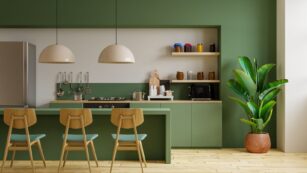
As a business owner or property manager, understanding the responsibilities of commercial tenants is crucial for maintaining a smooth and cost-effective operation. One common area of confusion is the responsibility for roof repairs in commercial properties. Are commercial tenants responsible for roof repairs?
Generally, commercial tenants are not responsible for roof repairs. The landlord or property owner is typically responsible for maintaining and repairing the building’s structure, including the roof, unless explicitly stated otherwise in the lease agreement.
However, this brief answer doesn’t cover all scenarios. There are instances where commercial tenants may be held responsible for roof repairs, depending on the terms of their lease agreement and the nature of the damage. Continue reading to learn about these exceptions and how they might affect your business or property management decisions.
When Might Commercial Tenants Be Responsible For Roof Repairs?
While it’s generally the landlord’s responsibility to handle roof repairs, there are situations where commercial tenants may find themselves footing the bill. One common scenario is when the lease agreement includes a “net lease” clause. In a net lease, tenants typically agree to pay for some or all of the property’s operating expenses, which can include maintenance and repairs.
Another situation where tenants might be responsible is if the roof damage is caused by their actions or negligence. For example, if a tenant installs heavy equipment on the roof without proper authorization or support, and this leads to structural damage, they may be held liable for the repairs.
It’s also worth noting that some commercial leases include specific provisions about roof maintenance and repairs. These clauses can vary widely, so it’s crucial for tenants to carefully review their lease agreements before signing.
How Can Commercial Tenants Protect Themselves From Unexpected Roof Repair Costs?
Tenants should proactively protect themselves from unexpected commercial roof repair costs to avoid surprises and potential disputes. The first and most crucial step is thoroughly reviewing the lease agreement before signing. Pay close attention to sections dealing with maintenance, repairs, and tenant responsibilities.
To avoid surprises and potential disputes, commercial tenants should take proactive steps to protect themselves from unexpected roof repair costs. The first and most crucial step is to thoroughly review the lease agreement before signing. Pay close attention to sections dealing with maintenance, repairs, and tenant responsibilities.

If the lease terms seem unclear or potentially unfavorable, don’t hesitate to negotiate. Many landlords are willing to discuss and clarify terms, especially for long-term or high-value tenants. Consider seeking legal advice to ensure you fully understand your rights and obligations.
Another smart move is to document the condition of the roof at the start of your tenancy. This can be done through a professional inspection or by taking detailed photos and notes. Having this record can help protect you from being held responsible for pre-existing issues.
What Should Commercial Tenants Do If A Roof Repair Dispute Arises?
Despite best efforts, disputes over roof repairs can still occur. If you find yourself in this situation, the first step is to review your lease agreement carefully. Understand what it says about repair responsibilities and any dispute resolution processes.
Next, communicate openly with your landlord. Many disputes can be resolved through calm, professional discussion. Present any evidence you have, such as documentation of the roof’s condition at the start of your lease or proof that the damage wasn’t caused by your actions.
If direct communication doesn’t resolve the issue, consider mediation. This can be a cost-effective way to reach a mutually agreeable solution without resorting to legal action. However, if mediation fails or isn’t an option, you may need to consult with a lawyer specializing in commercial real estate law to understand your legal rights and options.
How Does The Type Of Commercial Lease Affect Roof Repair Responsibilities?
The type of commercial lease you have can significantly impact your responsibility for roof repairs. There are several common types of commercial leases, each with different implications for tenants.
In a gross lease, also known as a full-service lease, the landlord typically covers all operating expenses, including roof repairs. This type of lease offers the most protection for tenants when it comes to unexpected repair costs.
On the other hand, a triple net lease (NNN) places more responsibility on the tenant. In this type of lease, the tenant pays for property taxes, insurance, and maintenance costs in addition to rent. This could include roof repairs, depending on how the lease is structured.
A modified gross lease falls somewhere in between, with responsibilities shared between the landlord and tenant. The specifics can vary widely, so it’s crucial to understand exactly what you’re agreeing to in terms of repair responsibilities.
What Are Some Red Flags In Lease Agreements Regarding Roof Repair Responsibilities?
When reviewing a commercial lease agreement, there are several red flags to watch out for regarding roof repair responsibilities. One major warning sign is vague or ambiguous language about who is responsible for different types of repairs. Clear, specific terms are always preferable.
Be cautious of clauses that make the tenant responsible for all repairs, regardless of cause. This could potentially leave you on the hook for costly repairs due to natural disasters or pre-existing structural issues.

Another red flag is a lack of distinction between routine maintenance and major repairs. While it might be reasonable for a tenant to handle minor upkeep, major structural repairs like roof replacement should typically fall to the landlord.
Watch out for clauses that require tenant approval for necessary repairs. This could lead to situations where you’re indirectly responsible for repair costs but have no control over when or how they’re carried out.
Lastly, be wary of any clause that requires you to return the property in better condition than you received it. This could potentially make you responsible for improving the roof, even if you didn’t cause any damage.
Taking Action: Protect Your Business
Now that you understand the complexities surrounding commercial tenants’ responsibilities for roof repairs, it’s crucial to take proactive steps to protect your business. The most important action you can take is to thoroughly review your current or prospective lease agreement, paying close attention to clauses about maintenance and repairs. If you’re not confident in your ability to interpret the legal language, consider hiring a commercial real estate attorney to review the lease with you and explain any potential risks or liabilities.












